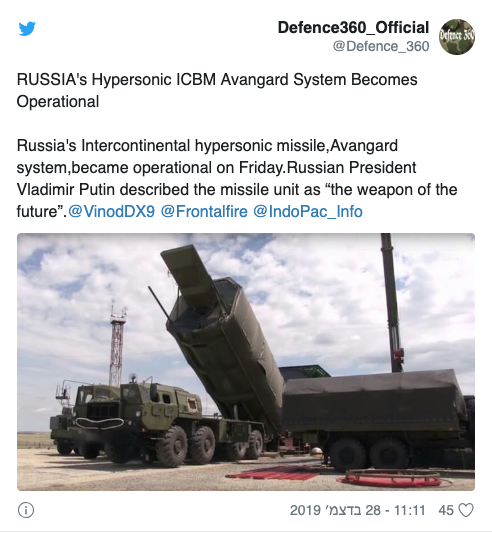
Russia claims that its hypersonic missile can travel at 27 times the speed of sound to anywhere in the world and cannot be intercepted.
Sara Rubenstein, 28/12/19 19:18
Russia’s Defense Minister Sergey Shoygu confirmed on Friday that the Avangard, its new nuclear-capable hypersonic missile system that can travel at 27 times the speed of sound is ready for “combat duty.”
President Vladimir Putin boasted that the Avangard hypersonic glide missile can reach anywhere in the world and places Russia as the world leader in a new class of weapons.
“Not a single country possesses hypersonic weapons, let alone continental-range hypersonic weapons,” Putin said.
Putin added that the intercontinental missile system can evade US-built missile shield defenses and “cannot be intercepted.”
“The Avangard is invulnerable to interception by any existing and potential missile defense means of a potential enemy,” Putin stressed.
The Avangard, which can hold a nuclear weapon weighing up to two megatons, is capable of sharp maneuvers in the atmosphere, unlike regular missile warheads that follow a set path, which makes it almost impossible to be intercepted. Existing anti-missile defense systems are incapable of defending against a glide vehicle’s trajectory and if Russia’s claims are true, the Avangard initiates a new and perilous step in the nuclear arms race.
US military analysts have expressed skepticism of Russia’s claims about the effectiveness of its hypersonic weapons. The Pentagon stated that it would “not characterize the Russian claims” about the Avangard’s capabilities
Russia has stated that it is also developing underwater hypersonic drones.
China has successfully tested a hypersonic glide vehicle which can travel five times the speed of sound.
The United States does not currently have hypersonic weapons but US Secretary of Defense Mark Esper said in August that he believes the US will have one in a couple of years. The US Air Force granted a contract to Lockheed Martin earlier this year to develop a hypersonic missile system.